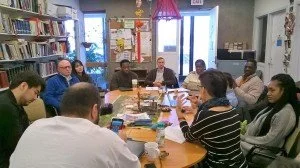Colombia Dispatches: Mission in Reverse
01-19-2016
Students in the Colombia Travel Seminar explore the reality of violence from the Christian community from as many points-of-view and contexts as possible in the next 3 weeks. We will interface with the “Church in Colombia” with the goal of learning a Colombian perspective on violence and to share an American perspective on violence as it is experienced and perceived, which may be drastically different views.
We have a very diverse group traveling to Colombia for this important seminar, so one of our first tasks was to get to know each other. Within our first 4 days together in the LRWC, our sharing has created an immediate bond that has grown with every session. The Mutual story—telling/listening and getting to know one another was prepared us well to travel together. Our stories were various and held lines of similarity and difference. After spending a semester with some of the individuals who shared, it was amazing to hear the stories that frame the individuals we have come to know more deeply. Rev. Dr. Claude Marie Barbours, a professor at Catholic Theological Union, introduced the idea of “mission in reverse” a concept that promotes a deep, soulful capacity to listen. In The Healing Circle, mission in reverse is described as “simple: be present, build bridges, understand issues of context, and be engaged in mutual sharing.” Mission in reverse is building and acknowledging cultural contexts, and having empathy and understanding. Barbour then goes on to say something that is essential for all parties when trying to engage and achieve the results of listening and peace making. “Outsiders come to a new culture only as invited listeners or learners and not talkers and teachers.” This is done mutually between all parties involved. These interactions occur extemporaneously without attention to time nor agendas. They are “care-filled awareness to unfolding relationships-to each other, to ourselves…to the natural world.”
We then shifted to talks about violence and the face of violence in the United States, specifically Chicago, and then Colombia.
Systemic Violence: systems of oppression; disguised as “laws of the land” that seek to oppress certain classes of people; specifically, black and brown people. These “laws” appear to be just and beneficial at the surface, but are built to “keep the rich as rich and the poor as poor”. Bennie Lee, former gang member turned activist for the rights of convicted felons, shed light on many civil injustices that block the re-entry of convicted felons into society. From Bennie Lee we got an inside look at gang life, prison life, survival techniques, re-entry training and a general lesson on the life of a street gang leader. His lessons were unforgettable, enlightening and frightening at the same time, a look into a world that most of us have not even read about. Reading a few articles makes us think we have insight into violent contexts and situations, until we are really enlightened by someone who really knows that life or situation. This seminar left many wanting more, wanting to help, and wanting to eliminate those elements that fuel these stories.
Domestic Violence: Dr. Sharon Ellis Davis defined domestic violence as ‘a pattern of assaultive and coercive behaviors that adults or adolescents use against their intimate partners.’ It is a form of power and control manifested in physical, sexual and violent ways. No matter the cause of the abuse, we must learn to recognize the signs and provide the resources and roadblocks that will minimize its effects on the abused. We came away feeling empowered to present God as a helper and encourage the abused to treat their own bodies as a temple of God and to use that as guidance and direction during moments of crisis.
Forgiveness – Recognition – Peace
Third, our class spent time considering questions such as why we were to visit Colombia, what to learn during the travel, and what to share with Colombians and Colombian seminary students. The best we can do is try to understand the reality of the domestic/international violence in Colombia, and we can share our stories of gun violence, racism, and so on. Actually, the period of the travel will be brief to understand their reality of the violence so it will be good to have time to befriend our hosts. If we have some time with them, it will be good to share mutual stories with each other, to practice mission in reverse as we are growing to understand it.
Many thanks to students Tiffaney Ross, Francisco Medrano, Seo Young Kim and Anthony Gregory for authoring this post.
Pre-travel orientation in the Learning Resource and Writing Center (LRWC)



